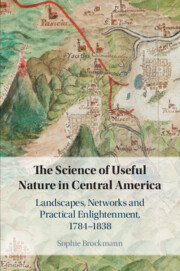‘Moving well beyond the well-trodden historical terrain of Western Europe and the British Atlantic World, Brockmann forcefully demonstrates how new insights into the histories of science, the Enlightenment, and modernity as well as colonialism and the nation-state can be gained by considering these phenomena from the perspective of Central America.’
Matthew James Crawford - Kent State University
‘Brockmann’s ground-breaking book expertly and engagingly brings Central America into view as eighteenth- and nineteenth century reformers saw it, a laboratory in which scientific engagement was harnessed to encourage economic development, state making and cultural change. Deeply researched and compelling, her argument and analysis will be a must read for those working on the region.’
Jordana Dym - Skidmore College, New York
‘Sophie Brockmann’s learned and elegant treatment of Central American science in the age of Enlightenment will change the way we think about knowledge-making in Spanish America. While never losing sight of the ground-level view - ruins and rice and plantains - The Science of Useful Nature offers expansive, novel panoramas on a new world epistemology that is both distinctly Central American and ineluctably global.’
Sylvia Sellers-García - Boston College
‘The Science of Useful Nature will be a welcome contribution to graduate seminars on eighteenth-century networks, information history, and Latin American history, especially courses on Central America and revolutions.’
Allison Margaret Bigelow
Source: Agricultural History
‘… richly detailed and engaging … [a] very fine study.’
Kevin Gosner
Source: Hispanic American Historical Review
'The effect of this thoroughly documented study of the practical applications of learning in Central America is to bring the region more firmly into the fields of applied sciences, Enlightenment studies, histories of science, and environmental history.'
Paul Ramirez
Source: H-Net
'Brockmann contributes an impressive wealth of archival material to this growing literature by drawing attention to the often-overlooked case of Guatemala. The study is at its best when it stays clear of the more fashionable theoretical trends, to build persuasive case studies with little-known material.'
Miruna Achim
Source: Technology and Culture



